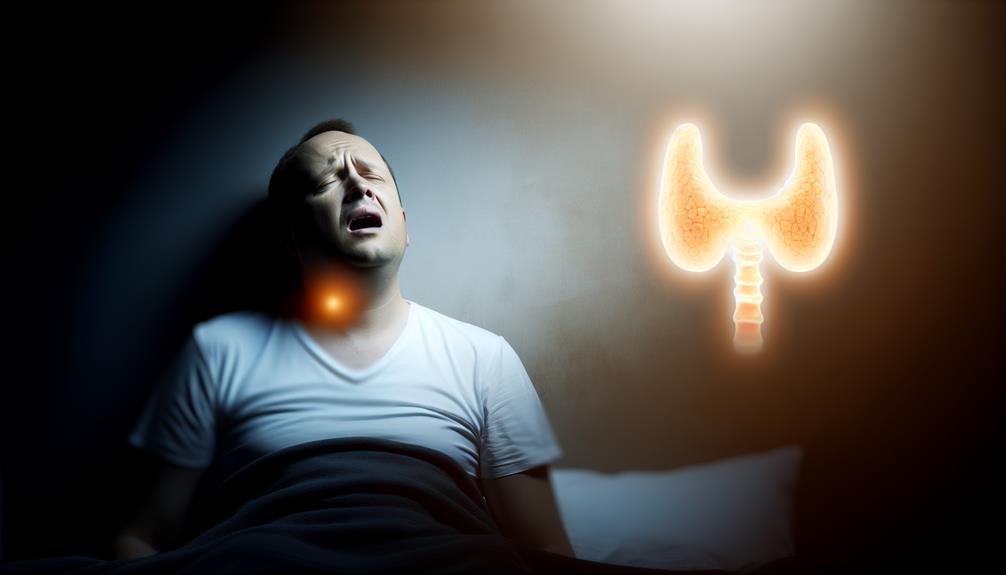In my analysis of hormone imbalances impacting men's energy levels, I find several key causes. Testosterone deficiency, especially in men over 45, is prevalent and linked to fatigue, reduced libido, and muscle loss. Elevated cortisol from chronic stress can also hinder testosterone production, further depleting energy. Additionally, thyroid dysfunction and nutritional deficiencies—such as low vitamin D and minerals like zinc—can exacerbate fatigue. Lifestyle choices, including sleep quality and physical activity, critically influence hormone stability. Addressing these factors is essential for restoring energy levels, and there's much more to explore in understanding this complex issue.
Testosterone Deficiency

Testosterone deficiency, often referred to as low testosterone or hypogonadism, can greatly impact a man's health and quality of life. From my perspective, this condition can lead to a myriad of symptoms, including reduced libido, fatigue, and even muscle mass loss. Understanding the causes of testosterone deficiency is vital for effective management. Various factors contribute to this imbalance, such as age, obesity, chronic illnesses, and certain medications.
When I consider hormone therapy, it becomes clear that testosterone replacement can be a significant treatment option. This therapy aims to restore testosterone levels to a normal range, alleviating symptoms and improving overall well-being. The methods of administration for testosterone replacement include injections, patches, and gels, each with its own advantages and drawbacks.
It's essential to approach testosterone replacement therapy with caution. Regular monitoring of hormone levels is necessary to avoid potential side effects, such as increased risk of cardiovascular events or prostate issues. My analysis indicates that not every man with low testosterone requires treatment; lifestyle modifications, including diet and exercise, can also play a substantial role in managing symptoms.
Elevated Cortisol Levels
Elevated cortisol levels, often referred to as "the stress hormone," can greatly disrupt a man's hormonal balance and overall health. When I experience prolonged stress, my body responds by producing excess cortisol. This hormone, while essential for the fight-or-flight response, can wreak havoc on various bodily functions when levels remain elevated over time. I've noticed that high cortisol can lead to decreased testosterone production, which directly impacts my energy levels, mood, and motivation.
Understanding the mechanisms of cortisol reduction is critical for effective stress management. Elevated cortisol can trigger a cascade of physiological responses, including increased insulin resistance and inflammation, contributing to fatigue and difficulty in maintaining muscle mass. I've learned that managing stress through techniques like mindfulness, regular exercise, and adequate sleep can considerably lower cortisol levels. These strategies not only help in cortisol reduction but also improve my overall sense of well-being.
Additionally, I find that incorporating adaptogenic herbs, such as ashwagandha or rhodiola, into my routine has beneficial effects on cortisol levels. It's fascinating how these natural options can support my body's ability to cope with stress. By focusing on stress management techniques and being proactive about cortisol reduction, I can maintain a healthier hormonal balance. This awareness empowers me to make informed choices that positively affect my energy levels and overall health. Remember, managing cortisol isn't just about feeling better in the moment; it's about fostering long-term hormonal health.
Thyroid Dysfunction

Thyroid dysfunction can greatly impact a man's hormonal balance and overall health. When I think about how vital the thyroid is, I realize that it's not just about metabolism; it's about hormone regulation across the board. Thyroid disorders can lead to a cascade of effects that disrupt various hormonal pathways, ultimately affecting energy levels.
Here are four key aspects to reflect on:
- Hypothyroidism: This condition can slow down metabolism and lead to fatigue, weight gain, and depression.
- Hyperthyroidism: Conversely, this can cause excessive hormone production, leading to anxiety, irritability, and weight loss.
- Autoimmune Disorders: Conditions like Hashimoto's thyroiditis can create fluctuations in hormone levels, leading to energy depletion.
- Treatment Effects: Medications for thyroid disorders can also alter hormone regulation, potentially leading to imbalances.
In my experience, it's essential to recognize the symptoms of thyroid dysfunction early. Fatigue, mood changes, and weight fluctuations can all be signs that your thyroid isn't functioning properly. I've learned that addressing thyroid disorders is vital for restoring hormonal balance. Proper diagnosis and treatment can empower you to regain energy and enhance your overall well-being. If you suspect thyroid issues, consulting with a healthcare provider can be a pivotal step in understanding and managing your hormonal health.
Nutritional Deficiencies
Nutritional deficiencies can profoundly influence a man's hormonal health, often leading to imbalances that affect everything from energy levels to mood. When I consider the role of nutrition, it's clear that both vitamin absorption and mineral balance play critical roles in maintaining ideal hormone levels. For instance, deficiencies in essential vitamins, such as Vitamin D and B vitamins, can disrupt the synthesis of hormones like testosterone, which is crucial for energy and overall vitality.
I've noticed that many men overlook the importance of micronutrients in their diets. Magnesium, zinc, and selenium are minerals that not only support metabolic processes but also aid in hormonal regulation. A lack of these minerals can lead to decreased testosterone levels, which directly impacts energy and motivation. It's fascinating how interconnected our nutrition is with our hormonal health; for example, without sufficient vitamin D, the body struggles to absorb calcium, which can further disrupt hormonal pathways.
Moreover, the process of vitamin absorption can be compromised by factors such as age, digestive health, and even the presence of certain medications. If the body can't effectively absorb these essential nutrients, the consequences can be significant. I urge you to pay attention to your dietary choices and consider a thorough approach to nutrition, ensuring that you're not only consuming enough calories but also the right balance of vitamins and minerals. By addressing these nutritional deficiencies, you can create a more favorable environment for hormonal stability and improved energy levels.
Lifestyle Factors

Although many may not realize it, lifestyle factors play a pivotal role in hormone balance for men. When I analyze my daily habits, I see how easily they can disrupt hormonal equilibrium, leading to decreased energy levels. Here are four critical lifestyle factors that I've identified:
- Stress Management: Chronic stress elevates cortisol levels, which can suppress testosterone production. Practicing effective stress management techniques, such as mindfulness or regular physical activity, is essential for maintaining hormonal balance.
- Sleep Hygiene: Quality sleep is non-negotiable for hormonal health. Disrupted sleep patterns can considerably impact testosterone levels and overall energy. I prioritize good sleep hygiene by maintaining a consistent sleep schedule and creating a restful environment.
- Physical Activity: Regular exercise not only boosts testosterone levels but also improves mood and energy. I've found that incorporating both strength training and cardiovascular workouts into my routine is beneficial.
- Substance Use: Alcohol and tobacco can negatively influence hormone production. Limiting or eliminating these substances has been a game-changer for my energy levels.
Frequently Asked Questions
How Do Environmental Factors Influence Hormone Levels in Men?
Oh sure, let's blame it all on "environmental factors" while we guzzle soda and scroll through social media! Pollution exposure and chemical exposure are just the tip of the iceberg. My dietary choices and lifestyle habits—like that couch potato routine—play a huge role too. Exercise impact? Don't get me started! Endocrine disruptors are lurking everywhere, shaping our hormone levels. It's a perfect storm of bad decisions and modern life.
Can Certain Medications Cause Hormone Imbalances Affecting Energy?
Absolutely, certain medications can lead to hormone imbalances that affect energy levels. For instance, corticosteroids and some antidepressants often disrupt endocrine function. The dosage effects play an important role; higher doses may amplify these hormonal shifts, worsening fatigue. I've noticed that even over-the-counter medications can have unexpected impacts on hormone levels. It's essential to monitor how different medication types interact with your body, especially if you're experiencing unexplained energy drops.
Are There Specific Age-Related Changes Impacting Hormone Balance?
Isn't it interesting how we often overlook age-related changes? Personally, I've noticed that as I age, there's an undeniable decline in certain hormones. These hormonal fluctuations can greatly affect our overall well-being. It's not just about feeling tired; it's a complex interplay of various hormones like testosterone and cortisol. Understanding these shifts can help us navigate this inevitable process and maintain our vitality as we get older.
What Role Does Sleep Quality Play in Hormone Regulation?
I believe sleep quality greatly influences hormone regulation. Sleep deprivation disrupts our circadian rhythm, leading to hormonal fluctuations that can affect mood, appetite, and energy levels. It's essential to prioritize restorative sleep as a recovery strategy. By doing so, we can help maintain a balanced hormonal environment, mitigating the negative impacts of inadequate sleep. Implementing good sleep hygiene practices can enhance overall well-being and optimize hormonal health in the long run.
How Can Stress Management Improve Hormone-Related Energy Levels?
I've found that stress management greatly improves energy levels. By focusing on stress reduction, I've noticed a positive shift in my overall well-being. Incorporating mindfulness techniques, like meditation and deep breathing, helps me stay grounded and reduces cortisol levels, which can otherwise sap my energy. These practices not only enhance my mental clarity but also contribute to a more balanced hormonal response, ultimately boosting my energy throughout the day.
